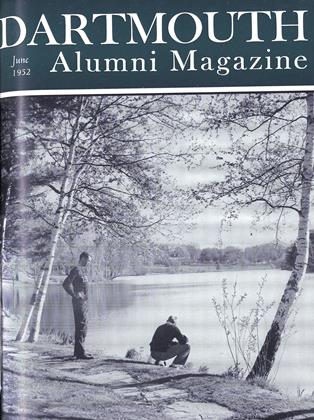Last December the Faculty Council requested the Faculty Committee on Athletics to make a special study of the status of intercollegiate athletics at Dartmouth. It suggested that the topics covered should include the effects of intercollegiate sports on the academic work of athletes, scholarship aid to athletes, the admission policy of the College with reference to athletes, the length of schedules and training periods, the proportion of out-of-town games, measures taken to assure good sportsmanship as a major objective, and the relation of the alumni to the formation of athletic policies.
The Committee on Athletics, composed of Prof. Richard H. Goddard '20, chairman, Prof. Herbert W. Hill and Prof. Frank G. Ryder, made its report to the Faculty Council on April 23. The general finding was that in all respects the status of intercollegiate athletics at Dartmouth is healthy and in harmony with the primary educational objectives of the College.
The Committee's rather voluminous report ran to 60 mimeographed pages and included special statements and tables prepared by Dean Neidlinger; Albert I. Dickerson, director of admissions; and Prof. Francis J. Neef, chairman of the committee on scholarships and loans. Space is not available here to go into the interesting detail presented in the report; the following brief summary presents only the general conclusions of the Committee.
The academic work of men on the Dartmouth teams shows no appreciable difference from that of the college as a whole, the Committee reported, and does not suffer from participation in sports. With 73% of the football letter men from 1948 to 1951 standing in the top 60% of their classes, Dartmouth's record in this respect was found to be the second highest in the Ivy
In admission and scholarship aid, the athlete is treated neither with special favor nor with discrimination, the Committee found. He must meet all competition, as do others. All scholarship aid is under College control and is awarded on the basis of need. With many athletes coming from less affluent families, their grants have averaged slightly higher than the average for the freshman class as a whole, but this difference amounted to $29 a man for the Class of 1951 and in its variation from class to class reached a high of only $99 a year Scholarship men, it was shown, are just as active in non-athletic activities as in athletics, and their academic standing is high.
The Committee found no over-emphasis in the present length of schedules and training periods, and felt that in the case of football the financial realities made the number of out-of-town games necessary. Hockey schedules are usually long, but uncertain ice conditions and numerous cancellations make this cushion reasonable.
"There is a perfectly healthy desire to win but no evidence of a desire to win regardless of the means," the Committee reported. "Our teams are well coached by gentlemen and our players, with few exceptions, represent the College in a manner of which we can be proud."
With regard to alumni influence on athletic policy, it was stated: Interest which alumni have in Dartmouth sports is genuine and valuable. It is almost always cooperative, and there have been only rare instances of attempted interference. It is properly channeled through the Alumni Council, so that any pressure-groups have to contend with really responsible alumni leaders in order to have any serious effect upon college policy. The history of alumni participation in the control of Dartmouth athletics has been one of unvarying wisdom and helpful contribution."
The important place that intercollegiate athletics have in the extracurricular life of Dartmouth undergraduates is indicated by the Committee's finding that approximately one man out of every five in the student body actually competes on an athletic team, and that twice as many are on the squads.
 View Full Issue
View Full Issue
More From This Issue
-
 Article
ArticleDeaths
June 1952 -
 Class Notes
Class Notes1918
June 1952 By ERNEST H. EARLEY, DONALD L. BARR, RICHARD A. HOLTON -
 Article
ArticleThe Cold War and Liberal Education To a Father From a Dean
June 1952 By STEARNS MORSE -
 Class Notes
Class Notes1929
June 1952 By F. WILLIAM ANDRES, EDWIN C. CHINLUND, GEORGE B. REDDING -
 Class Notes
Class Notes1926
June 1952 By HERBERT H. HARWOOD, H. DONALD NORSTRAND, ANDREW J. O'CONNOR -
 Article
ArticleThe Undergraduate Chair
June 1952 By CONRAD S. CARSTENS '52
C. E. W.
Article
-
 Article
ArticleTHE MASSACHUSETTS GROUP OF DORMITORIES.
April, 1912 -
 Article
ArticleINTERCOLLEGIATE DISARMAMENT CONFERENCE
November 1921 -
 Article
ArticleFaculty Publications
May 1951 -
 Article
ArticleGordon P. Chipman '26
JUNE 1963 -
 Article
ArticleSave the World
Mar/Apr 2012 -
 Article
ArticleThe Undergraduate Chair
June 1956 By RICHARD L. GORDON '56








